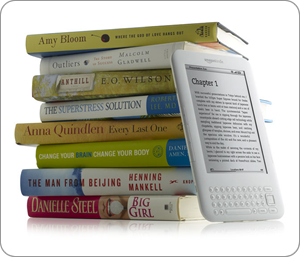Allergies, Kindle, and the death of twentieth century literature


Sure, that's sad. But I'm afraid it could be much worse than the death of the large brick-and-mortar bookstores, that killed the small mom-and-pop bookstores, only to make room for the mighty Amazon. The outcome of that battle was decided in our culture so long ago that most of us can no longer be guilted about shopping there.
I am worried that, unless we do something to actively make sure twentieth century literature gets moved into the Kindle format, it might be lost.
People are downsizing and getting rid of old books
Everywhere I go, people are telling me that they're downsizing, which includes getting rid of a lot of their old books. I'm doing it, too.
I just moved into a smaller place. I made the difficult decision to get rid of several thousand pounds of books I'd lugged with me each and every time I moved, ever since I was a teenager. As a lifelong, avid reader, I loved those books. I'd added scores of new books to my library along the way.
As much as I considered those books to be treasures, and despite the admonishment I grew up with that it was a grievous crime to throw away a book, I actually had to recycle many of my old friends.
I found out that they're really hard to donate.
Libraries don't want old books! That really surprised me. It's gotten very hard to find people and organizations to take boxes of books.
The trend in downsizing is partly to do with rising heating and cooling costs. Although books provide insulation (an excuse that I, as a bibliophile, often used to justify keeping wall-to-wall bookcases), people are starting to find it expensive to keep them around because they take up a lot of space.
These days, people are letting the cloud store physical goods. The books people are keeping around are just getting older and moldier.
Allergies abound
According to the American College of Allergy, Asthma, and Immunology, a large percentage of people in the general populace are allergic to dust mites and mold, and almost all asthma sufferers have to contend with these allergies in addition to the other things that assault their airways. Asthma itself is on the increase.
Some of the books I let go of weren't in perfect condition. I'd read many of them multiple times. I'd purchased a good number of them from used bookstores to begin with. Their pages were dog-eared and yellowed. Some were actually crumbling.
Also, I've lived in some tropical climates and I haven't always had air conditioning. At one point I had to carefully box up my books and store them in a friend's basement for a year and a half while I was living in Hawaii. More than a few of my dear old books had attained a slightly musty odor, vaguely reminiscent (or so I told myself) of an old wizard's library in a fairy tale.
Our homes are our castles, and we all want to hold onto our prized possessions. However, doctors often recommend that people suffering from allergies and asthma avoid accumulating items that gather dust, especially in areas where you sleep.
Ironically, once dust reaches critical mass, the more often you wave your magic dusting wand and stir up the dust you're trying to remove, the more often you're likely to sound like Sir Sneeze-a-lot or Lady Wheeze-a-lot.
In all seriousness, though, airway compromise is no joke. Sneezing is one thing, but contact with allergens can send an asthma sufferer into an attack within seconds, which is not only frightening, but life threatening as irritated airways tighten and cut off oxygen.
Also, used books can be hazardous for people who are allergic to animal dander. It's not always possible to be sure that the used book you're buying has always been in a pet-free zone. People with animal allergies may break out in hives and rashes, and have breathing difficulties, which makes every used book a potential hazard, and better off avoided.
I have to admit I don't sneeze quite as often now that I've removed loads of allergens from my atmosphere.
Next: The great ebook reading experience »
« Previous: Clutter and allergens
The ebook reading experience is just so great
Presbyopia (literally "old eyes") is sometimes considered a not so subtle reminder of reaching middle age. Many people don't like to wear reading glasses, citing inconvenience, headaches, and vanity as a few of the reasons why they avoid them (which also tells you why 3D TV may never be accepted by middle-agers).
Instead of the limited supply of large print books (often abridged for space considerations), to which our our elders had to resort, we have the Kindle, iPad, and other ebook readers. We can enlarge the type. If our eyes are feeling strained, we can kick back, close our eyes, and let the Kindle's friendly, computerized voice read to us like a robotic nanny.
Amazon's Kindle software runs on just about any platform, so we can pick up where we left off in the story from our phones, our computers, our iPads -- you name it. I expect to one day be reading them on my toaster!
It's also comparatively easy to hold a Kindle. There's no difficulty in trying to read without breaking its spine. The Kindle is thin, with a flat, crisp screen. It's way better than trying to hold a book in one hand, at the right focal distance, without being annoyed by hand discomfort and book pages that are bent, curved, warped, folded, spindled, mutilated, or torn. With synchronization, that bookmark that keeps falling out is no longer a problem.
These are a few of the Kindle's features and benefits that really rekindled my love of reading -- which I hadn't even realized had fallen off a bit when my eyesight started to change in middle age.
It's what finally made it okay for me to let go of my vast library of hardback and paperback books. That, and the fact that I promised myself that if I wanted to reread something I'd gotten rid of, I could just go ahead and buy it in Kindle format and read it.
At first, I busied myself with the myriad of free classics. They're available because they are past their copyright dates, have mostly been resurrected by Project Gutenberg, and are free in Kindle format.
Then, I received a link via email to BiblioQuest International's BibliOz.com, which lets you find out what books were on the New York Times best sellers list the week you were born. Just put in your birth date (day first, then month, then year), and the list pops up.
My husband and I spent an amusing afternoon checking out the books that marked our respective birth weeks.
I then decided to visit Amazon and check availability because I'd never gotten around to reading some of these fine, twentieth century American classics, and they sounded like great reads.
I was stunned.
Some were available in paperback or hardbound formats, for a penny (shipping costs much more than the book!) from numerous Amazon resellers. Some were available for a pretty penny (one was about $250). Only four or five of the 20 works of fiction on both of our lists, combined, were available in Kindle format.
These were not exactly obscure tomes.
They are books on the freakin' New York Times best sellers list in the latter half of the twentieth century. And they can't be had in a non-dust-ridden form factor. And don't think this isn't true of more recently published books, like books from the 1990s, either. Many of those also aren't available in Kindle format.
I'm kind of hoping it'll be like CDs and DVDs were at first. Many movies were only available on VHS, but as time has gone on, more and more things have been released on DVD, and more and more classic albums have been remastered and released on CD. Still, as we all know, many old favorites have not. Plus, I would be remiss not to mention that these are dying formats, too.
I believe it's possible that many great twentieth century books will simply be lost to time.
That's a shame. Sure, things are tantalizingly partially readable on Google Books, but this simply drives resale of physical books, which do have, pardon the obvious pun, a shelf-life.
The twentieth century was a time in history when there was an amazing confluence of creativity, publishing capability, distribution reach, and literacy. Plus, there was enough chaos in the times to produce some amazing stories, and enough societal openness to allow them to be addressed in a mass market.
I'm very concerned that publishers will not make their backlists available in Kindle format.
Many of the publishers may be out of business, but the copyrights are still held by someone. Conversion is a bit of effort, especially if there isn't an original digital version. Monetizing the project could be a challenge. Even so, there's no production, printing, shipping or storage when it comes to selling in the Kindle format. It's just dump it up on Amazon, charge a small amount (it could be a nice annuity over time) and save it for the future.
See also:
- RIP: Borders Books
- Review: Kobo eReader Touch may best the Nook as the top ebook reader
- With Borders dead, what's going to happen with Kobo?
- Borders in liquidation, check for great deals
- Why Amazon is winning online retail and should fold on this silly sales tax fight
- CBS News: Borders books to close, along with 10,700 jobs
Can we make this happen? Can we save the great books of the last century? Any ideas on how would incentivize it? Share your ideas in the TalkBacks below.